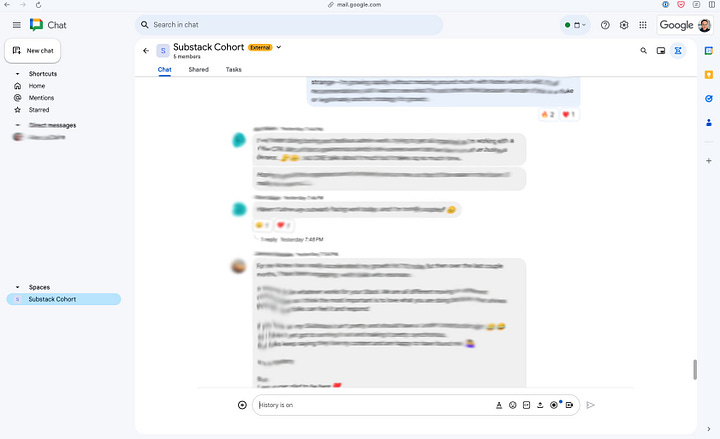November 3-1-1
3 updates, 1 useful tool, 1 impactful image
Three Updates
One: Novels are like children. It takes a village.
I called in the cavalry to help revise my novel manuscript. It might be overkill, but here’s everything I’ve been doing (or plan to do):
Join a fiction workshop with the SF Writing Salon;
Collab with multiple critique partners I found through Writing Mastery Academy;
Join a weekly virtual workshop with Berkeley Writers Circle;
Attend the San Francisco Writer’s Conference in February;
Apply to join a year-long workshop at Writer House;1
Attend The Shit No One Tells You About Writing Deep Dives seminar; and
Attend a Chuck Sambuchino Writer’s Day event in April.2
Critiques by other writers have been painful but essential. Beta readers help me understand what dialogue is believable, what events make sense, what parts of my setting are hard to imagine, and how to effectively choreograph the hero’s movements through space. I’m working hard at pacing and tone and mood.
Two: Try re-writing by hand.
Revising is hard because I have to actually write good prose now. I don’t know what my voice or style is. Being a lawyer beat the tendency to produce flowery language out of me. I am spare with my metaphors and my imagery tends to be concrete.
It’s strange—I love using metaphor and allegory when I write poetry. I just can’t seem to infuse that voice into my story-telling. When I try to do it, all I seem to push out is cliche metaphors.
The other day I started re-writing a scene by hand and that helped. Hand writing is slower than typing and forces my mind to write out the tangible images and sounds and sensations my hero is perceiving. I was surprised that it helped.
But I tried it again yesterday and it didn’t work. I just kept rewriting what I had already written before, without adding the texture and depth and complexity that makes a piece of writing really immersive for a reader. In short, revising is hard.
Do any of you have any suggestions for me?
Three: Writing can be taught, kind-of.
I started a novel-revision course with Writing Mastery Academy, and a few lectures in, I realized my manuscript needed a deeper sense of the hero’s character.
So I pivoted and started a course on effective character portrayal, where I learned that I had to include the character’s interior thoughts and bits of information that refer back to defining moments in her life.
That made me realize I don’t know how to smoothly insert those pieces into my scenes, which made me start yet another course focused on scene design. I’m about 1/3 way through the scene design course, and it has been critical.
I haven’t found a course on how to write beautiful prose. Maybe that’s the part of writing that just can’t be taught.
One Useful Tool
Google chat—a Slack alternative.
I’m part of a Substack writing group that is run primarily out of Slack. Five of us formed our own subgroup and we were using the Direct Messaging feature to communicate amongst just ourselves.
But recently we realized all our helpful comments and resources would disappear from Slack in six months unless we upgraded to the paid version.
We searched for an alternative and landed on Google Chat. I didn’t even know Google Chat was a thing. Turns out, the chat feature on Gmail actually has a home page that you can use as a group messaging board. It looks like this.


It’s totally free, and file sharing is actually easier than with Slack. (Share directly from gDrive). If you need a platform to communicate with a small group, and you’re tired of Slack, Dischord, etc, give Google Chat a try.
One Impactful Image
Mood for November is this picture. Deep contemplation that stems from paradigm shifts caused by world events.
This woman is my aunt. I took the picture in 2011 when I visited Bangladesh. We’re on a boat ride down the Padma river. Every time I look at this picture, I wonder what she’s ruminating about. A lifetime of memories? Regrets? Ambitions?
Thanks for sharing these resources Sarah Flocken.





wow. you cover a lot of ground here.
A couple of reactions that are on the top of my mind.
I started my novel late in life -- my third life, actually. I thought of a lot of those things you have listed to help me along as I started my novel, but I decided to reach out to five people whose writing and candor I respected. They weren't friends, exactly, but we certainly knew each other and three lived in other states. I was actually stunned the all said yes and most read multiple revisions, three read them all. On each revision, I also added someone who knew nothing about the book. All had a deep interest in writing and reading. Their critiques were fantastically helpful. They did not pull punches. On either end of the spectrum.
My favorite reaction relates to one of the comments you got hear regarding depth of characters. This woman lives in a double-wide in Colorado and runs her own house-cleaning business and is an amazing raw writer. (I met her in the weekly online writers group I started and ran for four years.) After the second draft she wrote, "Gevalt. You are still writing like a fucking journalist, you know, outside looking in. Get inside them for fuck's sake." Exact quote.
Another is an art therapist from Michigan who got her doctorate in working with people with damaged brains. Two of my characters have damaged brains. After the first full draft she called me up on the phone and mocked being pissed off at me saying, in so many words, that I'd gotten the two characters spot on -- medically speaking -- and how did I do that on a wing and a prayer when she is still paying off her loans for four years of learning all about that. Having that kind of resource (unexpected, again, she was in my writing group and I did not know her background) was key in helping me shape and fix those characters.
So for me that was enough. I didn't have to go to classes or programs or retreats even though I wanted to and thought it would be a good idea. It wasn't necessary. I had a very diverse, very particular audience who also were willing to devote an incredible amount of time and energy to my project.
It is a community process. Despite what everyone says. Just find yourself some diverse acquaintances who might be willing to help you out.
peace,
gg
Noor, either you're going to learn a lot or you're going to overwhelm yourself -- speaking as one self-overwhelmer to another...
It sounds like you're on the right track regarding adding the depth of character. Not knowing what the scene is, maybe having them reflect on what's happening or reveal some internal conflict about it.
In regard to the scene you keep re-writing -- does my article on writing strong scenes help? Are you asking yourself what the main point of the scene is? What the character wants and what will happen if they don't get it? Would using other sensory details beyond sight help?
Perhaps you can go back to another book that has the depth of character like you're trying to add and see how they did it will help.
That's great you're going to be doing the San Fran WDW - I like Chuck. I'll be an attending agent at a few WDW this year both in person and on line. Just not San Fran... that would've been fun :)
I know this isn't easy, but I know you can do it.